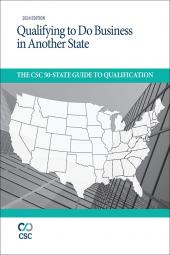Transactional Intellectual Property: From Startups to Public Companies
Select subscription type
Terms & conditions
Subscribers receive the product(s) listed on the Order Form and any Updates made available during the annual subscription period. Shipping and handling fees are not included in the annual price.
Subscribers are advised of the number of Updates that were made to the particular publication the prior year. The number of Updates may vary due to developments in the law and other publishing issues, but subscribers may use this as a rough estimate of future shipments. Subscribers may call Customer Support at 800-833-9844 for additional information.
Subscribers may cancel this subscription by: calling Customer Support at 800-833-9844; emailing customer.support@lexisnexis.com; or returning the invoice marked "CANCEL".
If subscribers cancel within 30 days after the product is ordered or received and return the product at their expense, then they will receive a full credit of the price for the annual subscription.
If subscribers cancel between 31 and 60 days after the invoice date and return the product at their expense, then they will receive a 5/6th credit of the price for the annual subscription. No credit will be given for cancellations more than 60 days after the invoice date. To receive any credit, subscriber must return all product(s) shipped during the year at their expense within the applicable cancellation period listed above.
Subscribers receive the product(s) listed on the Order Form and any Updates made available during the annual subscription period. Shipping and handling fees are not included in the annual price.
Subscribers are advised of the number of Updates that were made to the particular publication the prior year. The number of Updates may vary due to developments in the law and other publishing issues, but subscribers may use this as a rough estimate of future shipments. Subscribers may call Customer Support at 800-833-9844 for additional information.
Subscribers may cancel this subscription by: calling Customer Support at 800-833-9844; emailing customer.support@lexisnexis.com; or returning the invoice marked 'CANCEL'.
If subscribers cancel within 30 days after the product is ordered or received and return the product at their expense, then they will receive a full credit of the price for the annual subscription.
If subscribers cancel between 31 and 60 days after the invoice date and return the product at their expense, then they will receive a 5/6th credit of the price for the annual subscription. No credit will be given for cancellations more than 60 days after the invoice date. To receive any credit, subscriber must return all product(s) shipped during the year at their expense within the applicable cancellation period listed above.
Product description
View a sample of this title using the ReadNow feature
To purchase a printed version of this title, please visit www.caplaw.com.
Transactional Intellectual Property: From Startups to Public Companies is the successor to Intellectual Property in Business Organizations: Cases and Materials. This transactional, problem-based casebook focuses on the legal issues and opportunities confronting businesses that develop and utilize intellectual property (IP). It calls on students to analyze and help resolve typical IP-based issues encountered as businesses engaged in creative enterprises are founded, financed, expanded, transferred to others, or terminated.
The text is designed for law students in advanced classes concerning IP, technology transfer and licensing, business organizations issues as encountered in IP-based companies, and the law of science and technology. It is also suitable for engineering students seeking training in IP development and surrounding business considerations, as well as for business students in courses focusing on the legal problems of developing businesses. To aid students lacking a prior IP background, the text includes extensive background materials on important intellectual property standards.
This casebook considers IP-based business problems at three key phases in the life of a creative concern:
- The startup phase (when IP often plays key roles in business formation and venture capital financing);
- The mid-life phase (when IP is often an important factor in going public or selling a business through a merger into a larger concern); and
- The mature company phase (when successful firms must deal with problems such as preventing abuses of dominant IP positions and remaining competitive in complex high-tech markets despite being innovators in only small components of those markets).
The updates in the fourth edition of the text respond to many important legal developments in this fast-moving area. New materials in the fourth edition include coverage of:
- Additions to federal trade secret laws supplementing existing state law protections;
- Developing Supreme Court caselaw balancing and interrelating IP protections with antitrust laws governing commerce restrictions;
- New SEC standards for crowdsourcing of investments in IP-based businesses;
- Employment standards and dynamics underlying the alleged theft of trade secrets by Uber from Waymo (the successor to Google’s self-driving car project);
- Licensing of standard essential patents (SEPs) on fair, reasonable, and non-discriminatory (FRAND) terms and the factors employed in determining FRAND licensing royalties;
- Changes in the liquidity of marketplaces for transfers of IP interests such as IP auctions;
- Assessments of Tesla’s release of its patent rights as a means to spur development of further technologies in the electric vehicle field;
- Promises by Microsoft to use its IP rights to protect customers of the company’s cloud services;
- Practices of defensive patent aggregators that acquire pools of patents to prevent other parties from using the patents for aggressive patent infringement litigation; and
- The latest Supreme Court descriptions of actions exhausting patent rights, along with evaluations of the limits on IP-mediated business practices resulting from such exhaustion.
The new edition also incorporates numerous notes and comments updating and supplementing the topics addressed in the prior editions.
epub is protected by Adobe DRM.
eBooks, CDs, downloadable content, and software purchases are noncancelable, nonrefundable and nonreturnable. Click here for more information about LexisNexis eBooks. The eBook versions of this title may feature links to Lexis+® for further legal research options. A valid subscription to Lexis+® is required to access this content.
Table of contents
Introduction
Chapter 1: CREATING AND PROTECTING THE BUSINESS
Chapter 2: ORGANIZING AND FINANCING AN INTELLECTUAL
PROPERTY BASED STARTUP COMPANY
Chapter 3: TRADE SECRETS
Chapter 4: EMPLOYMENT ISSUES
Chapter 5: LICENSING IN BUSINESS ORGANIZATIONS
Chapter 6: INTELLECTUAL PROPERTY ASSETS AND THE
TERMINATION OF A BUSINESS
Chapter 7: INTELLECTUAL PROPERTY ISSUES IN MERGERS
AND ACQUISITIONS
Chapter 8: INTELLECTUAL PROPERTY DUE DILIGENCE AND
DISCLOSURES IN PUBLIC SALES OF STOCK
Chapter 9: ADVANCED TECHNIQUES FOR MAXIMIZING
INTELLECTUAL PROPERTY VALUE IN MATURE COMPANIES
Chapter 10: ADVANCED TECHNIQUES FOR MINIMIZING
RISKS OF INTELLECTUAL PROPERTY INFRINGEMENT IN MATURE COMPANIES
Chapter 11: THE ANTITRUST PERILS OF A DOMINANT
INTELLECTUAL PROPERTY POSITION
Chapter 12: ACQUIRING AND USING INTELLECTUAL
PROPERTY IN UNIVERSITY AND GOVERNMENTAL CONTEXTS
Chapter 13: INTELLECTUAL PROPERTY INFLUENCES ON
RESOURCE ALLOCATIONS: FOUR CASE STUDIES
Appendix: INTRODUCTIONS TO INTELLECTUAL PROPERTY
FOR THE NONSPECIALIST
Table of Cases
Table of Statutes
Index
 Lexis Nexis
Lexis Nexis 



